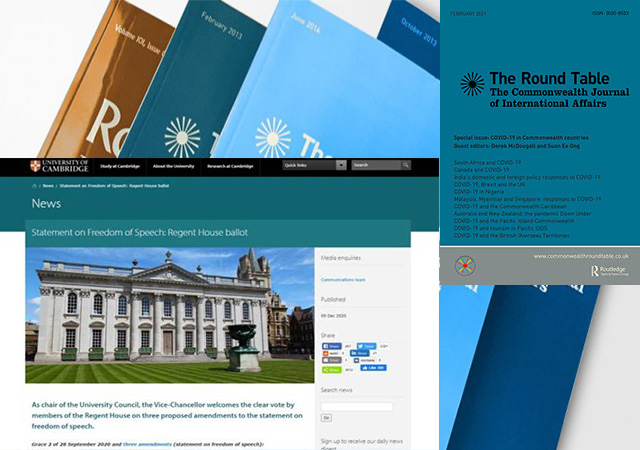
[This is an excerpt from an opinion piece appearing in the current edition of The Round Table: The Commonwealth Journal of International Affairs. Opinions expressed in articles do not reflect the position of the Round Table.]
In March 2020 the University of Cambridge proposed a ‘free speech’ policy requiring (inter alia): (a) that academics, students, staff and visitors ‘respect’ the opinions and ‘identities’ of others; and (b) that the University may prohibit speaker events that it reasonably expects to threaten the ‘welfare’ of students, staff or the general public. By demanding ‘respect’ the proposed code policed not only our speech but also our minds, as the actor and public intellectual, Stephen Fry, pointed out. Worse, the vagueness of ‘respect’, ‘identity’ and ‘welfare’ offered practically endless scope for abuse. One could easily imagine zealous or interested parties using (a) to exclude Richard Dawkins or Noam Chomsky for ‘disrespecting’ Christian or Jewish ‘identities’, or (b) to block Julie Bindel because her views on transgender people threaten their ‘welfare’ in some sense of that word.
I spelt out these concerns at a University discussion in June, but in September the University insisted on pressing ahead. I and my colleagues therefore proposed amendments eliminating (a) and (b) and forced a vote of the entire University. The Financial Times, Index on Censorship and the Cambridge Radical Feminist Network all supported our campaign, as did a former Astronomer Royal (Lord Rees), a Nobel laureate (Sir Greg Winter), a former Ambassador (Paul Collis) and the Minister of State for Universities. Turnout was very strong and the result was about 4 to 1 in favour of our amendments.3 In consequence our policy now offers strong and clear protection to the speech of academics, staff, students and visitors.
Why did it matter? At a time and place where no serious threats to free speech existed the ‘respect’ proposals would still have opened the door to exploitation by future censors. For that reason it would still have been necessary to fight them. But anyway, that time and place is not here and now: in Britain today, and especially and incredibly in British Universities today, free speech is more gravely threatened than at almost any time since 1689.
I got some sense of how things stand in this connection when I was soliciting signatures to force a vote. Normally it would have been a simple matter to get the 25 signatures necessary, but on this occasion many academics refused to sign, not because they didn’t support the amendments, but because they were afraid to do so in public.
A more specific threat concerns the rights of students and academics to raise questions about, trans people. Anyone who suggests, in print or orally, in public or in private, that, trans women should not be competing in women’s sports, or that single-sex toilets or prisons might possibly be worth preserving – any such person is now risking at best ostracism by his or her colleagues, and at worst disciplinary action, the loss of employment and even physical assault.
You could be forgiven for doubting it. Am I really saying that academics and students are being hounded for saying things that would be accepted by most people today and which until a few years ago would have been accepted as the merest common sense by nearly every human being who ever entertained them?
Yes, just so.
Arif Ahmed is a Reader in Philosophy, University of Cambridge, UK.



